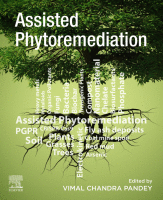Browse content
Table of contents
Actions for selected chapters
- Full text access
- Book chapterAbstract only
Chapter 1 - Understanding assisted phytoremediation: Potential tools to enhance plant performance
Garima Malik, Sunila Hooda, ... Vimal Chandra Pandey
Pages 1-24 - Book chapterAbstract only
Chapter 2 - Plant-assisted bioremediation: Soil recovery and energy from biomass
Valeria Ancona, Ida Rascio, ... Domenico Borello
Pages 25-48 - Book chapterAbstract only
Chapter 3 - Arbuscular mycorrhizal fungi-assisted phytoremediation: Concepts, challenges, and future perspectives
Anissa Lounès-Hadj Sahraoui, Maryline Calonne-Salmon, ... Joël Fontaine
Pages 49-100 - Book chapterAbstract only
Chapter 4 - Biochar assisted phytoremediation for metal(loid) contaminated soils
Manhattan Lebrun, Romain Nandillon, ... Domenico Morabito
Pages 101-130 - Book chapterAbstract only
Chapter 5 - Chelate-assisted phytoremediation
Dragana Ranđelović, Ksenija Jakovljević and Tijana Zeremski
Pages 131-154 - Book chapterAbstract only
Chapter 6 - Nanoparticles-assisted phytoremediation: Advances and applications
Omena Bernard Ojuederie, Adenike Eunice Amoo, ... Ayansina Segun Ayangbenro
Pages 155-178 - Book chapterAbstract only
Chapter 7 - Transgenic plant-mediated phytoremediation: Applications, challenges, and prospects
Omena Bernard Ojuederie, David Okeh Igwe and Jacob Olagbenro Popoola
Pages 179-202 - Book chapterAbstract only
Chapter 8 - CRISPR-assisted strategies for futuristic phytoremediation
Henny Patel, Shreya Shakhreliya, ... Vijai Singh
Pages 203-220 - Book chapterAbstract only
Chapter 9 - Approaches for assisted phytoremediation of arsenic contaminated sites
Ankita Gupta, Arnab Majumdar and Sudhakar Srivastava
Pages 221-242 - Book chapterAbstract only
Chapter 10 - Compost-assisted phytoremediation
Janhvi Pandey, Sougata Sarkar and Vimal Chandra Pandey
Pages 243-264 - Book chapterAbstract only
Chapter 11 - Bioremediation of contaminated soil with plant growth rhizobium bacteria
Metin Turan, Sanem Argin, ... Dilara Birinci
Pages 265-284 - Book chapterAbstract only
Chapter 12 - Phytobial remediation by bacteria and fungi
Gordana Gajić, Miroslava Mitrović and Pavle Pavlović
Pages 285-344 - Book chapterAbstract only
Chapter 13 - Recent developments in phosphate-assisted phytoremediation of potentially toxic metal(loid)s-contaminated soils
Tariq Mehmood, Cheng Liu, ... Nabeel Khan Niazi
Pages 345-370 - Book chapterAbstract only
Chapter 14 - Electrokinetic-assisted Phytoremediation
Luis Rodríguez, Virtudes Sánchez and Francisco J. López-Bellido
Pages 371-398 - Book chapterAbstract only
Chapter 15 - Biosurfactant-assisted phytoremediation for a sustainable future
N.F. Islam, Rupshikha Patowary and Hemen Sarma
Pages 399-414 - Book chapterNo access
Index
Pages 415-420
About the book
Description
Assisted Phytoremediaion covers a wide range of uses of plants for remediation of environmental pollutants. It includes coverage of such techniques as root engineering, transgenic plants, increasing the biomass, use of genetic engineering and genome editing technology for rapid phytoremediation of pollutants. In order to improve the efficiency of plant remediation, genetic engineering plays a vital role in the overexpression of genes or gene clusters, which are responsible for degradation and uptake of pollutants. The book presents state-of-the-art techniques of assisted phytoremediation to better manage soil and water pollution in large amounts.
This book is a valuable resource for researchers, students, and engineers in environmental science and bioengineering, with case studies and state-of-the-art research from eminent global scientists. This book serves as an excellent basis from which scientific knowledge can grow and widen in the field of environmental remediation.
Assisted Phytoremediaion covers a wide range of uses of plants for remediation of environmental pollutants. It includes coverage of such techniques as root engineering, transgenic plants, increasing the biomass, use of genetic engineering and genome editing technology for rapid phytoremediation of pollutants. In order to improve the efficiency of plant remediation, genetic engineering plays a vital role in the overexpression of genes or gene clusters, which are responsible for degradation and uptake of pollutants. The book presents state-of-the-art techniques of assisted phytoremediation to better manage soil and water pollution in large amounts.
This book is a valuable resource for researchers, students, and engineers in environmental science and bioengineering, with case studies and state-of-the-art research from eminent global scientists. This book serves as an excellent basis from which scientific knowledge can grow and widen in the field of environmental remediation.
Key Features
- Provides a clear picture of how to design, tune, and implement assisted phytoremediation techniques
- Offers a comprehensive analysis of current perspective and state-of-the-art applications of assisted phytoremediation
- Introduces the potential of genetic engineering as a rapid, cost-effective technology for environmental remediation using plants
- Provides a clear picture of how to design, tune, and implement assisted phytoremediation techniques
- Offers a comprehensive analysis of current perspective and state-of-the-art applications of assisted phytoremediation
- Introduces the potential of genetic engineering as a rapid, cost-effective technology for environmental remediation using plants
Details
ISBN
978-0-12-822893-7
Language
English
Published
2021
Copyright
Copyright © 2022 Elsevier Inc. All rights reserved.
Imprint
Elsevier
